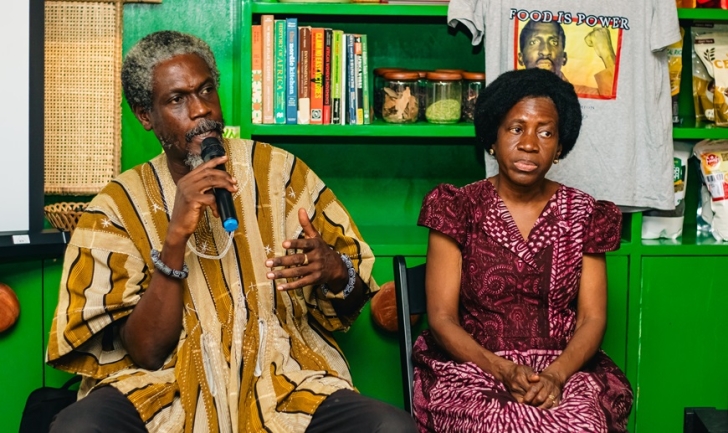Some environmental campaigners have said mercury contamination from illegal mining may remain in the food chain in Ghana for a generation even if illegal mining stops today.
At a panel discussion at the 'Gold No B Food' event in Accra on Friday, November 21, organised by the Ghana Food Movement, panelists discussed a growing concern about the effects of galamsey and the effects it has on food in Ghana.
They therefore want all Ghanaians to pay closer attention to where their food and water come from.
The event opened with the co-director of the Ghana Food Movement, Aimee Wallin, explaining that many people still treat illegal mining as a distant problem.
She said galamsey had “become an abstraction” for people living in Accra, even though the food they eat, plantain, vegetables, grains and fruits, comes from regions where soils and rivers are being polluted.
She said the event on 'Gold No B Food' was to help the public understand how mining was altering food sources, where contamination was likely to appear, and what households could do to protect themselves.
Anti-galamsey advocate Awula Serwah, Coordinator of Eco-Conscious Citizens, and Mr Edwin Baffour, Communications Director of Food Sovereignty Ghana, led the main discussion.
They said heavy metals such as mercury, cyanide and arsenic were slowly entering the country’s diets because polluted water often appeared clean, making it difficult for people to detect danger.
Ms Serwah said the colourless nature of these chemicals meant Ghanaians could be consuming polluted water without knowing it.
![]()
She added that the Ghana Water Limited’s treatment process “does not remove these contaminants,” raising concern about exposure among communities that rely on polluted rivers and streams.
Mr Baffour added that mercury could stay in soils and water bodies “for up to a generation,” travelling from water into crops, livestock and eventually human diets.
He said that even if all mining stopped immediately, “for a few years, people would just be so seriously sick,” which, according to him, was why some campaigners believed Ghana had only a “small window” left to prevent deeper harm.
The question-and-answer session reflected public frustration about the country’s direction. Participants raised concerns about the drop in protests, the suspected link between illicit gold and political financing, and the role of youth unemployment in pushing people towards mining.
One attendee said demonstrations that once drew thousands had lost momentum even as environmental damage continued to worsen.
Another participant asked whether citizens could influence change when those benefiting from illegal mining, including political actors, still had strong influence.
Ms Serwah replied that activism, pressure and public scrutiny had helped reverse harmful policies in the past and remained necessary.
Mr Baffour added that publicly naming individuals involved in illegal mining could discourage others and weaken what he described as a culture of impunity.

